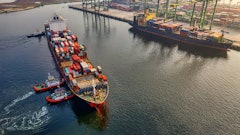For the past four years, you have worked in transportation and warehousing at Garden Fresh Gourmet, a Michigan-based producer of salsas, guacamole, chips and dips. You developed Freshlane Transit in 2004 to better service Garden Fresh Gourmet's customers. Earlier this year, Freshlane was granted brokerage authority and is now working with other food manufacturers as well. What was your role with Garden Fresh Gourmet and how did it evolve into Freshlane Transit?
Messerschmidt: During my tenure at Garden Fresh, I performed the duties of a typical transportation manager, analyzing and revising shipping methods, building and scheduling outbound loads, negotiating rates and so on. My predecessor had grown to rely on refrigerated LTL carriers for the majority of our shipments, so I followed suit and continued where he had left off.
The Garden Fresh executives are heavily customer-service oriented. Owner Jack Aronson has a restaurant background and his favorite quote is "You can serve a customer top-notch food for years, but if they find a hair in their dish once they may never come back." He applies this mentality to Garden Fresh customers, so it wasn't long until I was called into his office and blindsided about complaints from buyers with stores running out of product due to a late delivery, temperature issues or damaged freight.
In many cases the carrier had given no indication of problems, so the situation escalated to the highest levels before we had a chance to make things right. That was the real issue—the complete lack of accountability and communication from the carrier. They believed they could deliver our product when it fit into their schedule and what we didn't know wouldn't hurt us.
As Garden Fresh grew we found ourselves shipping to points further and further from our Ferndale, MI, base, which exacerbated the problem. There was a time that I worried about the security of my job due to carrier service failures.
What did you to do change the situation?
Messerschmidt: I took matters into my own hands. I pitched a proposal to establish a small private fleet, consolidating our LTL shipments into regions that could be shipped via multi-stop truckload on our own equipment—under our control.
We noticed the difference immediately, as did our customers. It wasn't that our trucks were more attractive or that we were so extraordinary that we could predict the unpredictable and avoid every potential problem inherent to transportation. Rather, it was that we were dedicated to doing everything within our power to get product where it needed to be when it needed to be there, and that we knew when something wasn't going as planned. With that knowledge we could communicate with concerned parties and devise solutions—we could be proactive in serving customers.
What services does Freshlane Transit offer?
Messerschmidt: Freshlane Transit is a carrier, broker and full-service third-party logistics provider focused solely on the transportation of food products. We can serve as a backup carrier on a casual basis to manufacturers with their own transportation system in place, a single-source liaison to the transportation industry or as a fully-functional traffic department for companies that don't want to concern themselves with freight.
There are plenty of brokers and 3PLs out there offering similar services and capabilities, but we are set apart by the fact that we understand the inner-workings of a food manufacturer's transportation system because we were born of those systems.
Freshlane's tagline is "Transportation solutions by a food manufacturer for a food manufacturer—because the freight industry doesn't understand." What doesn't the freight industry understand?
Messerschmidt: The problem with the freight industry is evident in the use of the term "freight."
Garden Fresh and companies like it don't manufacture freight, they manufacture product. Freight is something that needs to move from point A to point B for X amount of money. For most food manufacturers, product is much more than that and it deserves to be treated as more than boxes on a pallet.
Your contracted base of 20,000 trucks is made up of hand-picked carriers. What do you look for in carriers?
Messerschmidt: We are very selective when it comes to establishing relationships with carriers. The first part of our screening process includes checks on the standards, such as validity of authority, insurance coverages and an overview of their records with the FMCSA. We go a step beyond a typical brokerage by thoroughly investigating references, contacting shippers and brokers they've listed as customers as well as friends of ours at consignees and brokerages that carriers have likely dealt with at some time in the past. We've found skeletons in the closets of a few potential partners this way—some of which were disturbing and led to the disqualification of trucks that may otherwise have been allowed to haul our customer's product. This has kept us out of situations that would have compromised the integrity of our system and service.
How quickly do you expect to ramp up your service?
Messerschmidt: Our operation has focused primarily on the territories east of the Mississippi River until recent Garden Fresh business has taken us into the California market. We hope to work with customers nationwide as our bank of resources continues to grow. — Katherine Doherty












